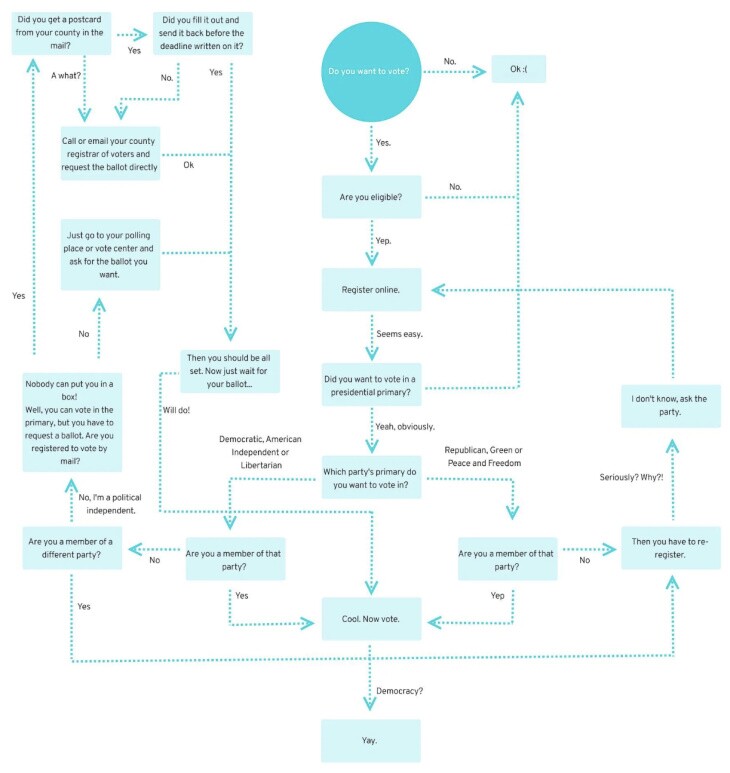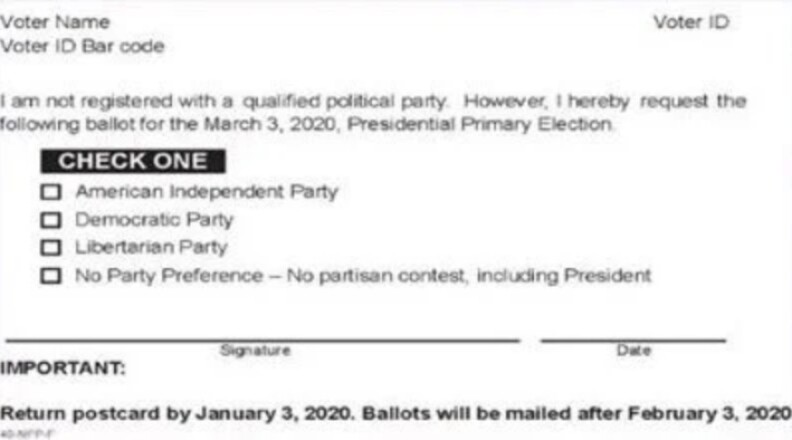How To Register Independent In California
By Ben Christopher | CalMatters
If y'all're confused about how to vote in California's presidential main, you're in good company with Susan Sarandon.
At the start of Jan, the "Thelma and Louise" actress and Sanders enthusiast issued a public service announcement on Twitter: "California voters: make sure to switch from contained to democrat (sic) in lodge to vote for �?�@BernieSanders."
Just 1 trouble: She's wrong. Political independents (known in California election parlance as "no party preference" voters) do non need to switch parties to vote in the Democratic presidential primary -- the just demand to asking a Democratic ballot offset.
Technically, Sarandon was retweeting the account @TimOnTheTractor -- just Tim (presumably) doesn't have an Academy Award. He also doesn't take 653,000 Twitter followers to misinform.
To be fair, the minutiae of California ballot law is really confusing! And Sarandon is hardly alone. Election day in California is March 3, merely already social media has become a bipartisan chorus of wrongness about the what, how and why of the state's presidential master.
If you're unsure about how to go the ballot you want, why things here are and then complicated or what presidential primaries are all about, hither are four things to know before yous vote:
THE PRESIDENTIAL PRIMARY WILL Not Use THE FAMILIAR "TOP TWO" Election
California voters can be forgiven for assuming that political party registration doesn't actually matter.
In 2010 voters backed a mensurate to create the state's nonpartisan "top two" election system, in which all main voters make full out a election with every candidate on it -- regardless of either the voter's or the candidate's political political party. The top ii winners so move on to the full general election ballot -- even if they're both from the same political party.
In races for state legislative and congressional seats, the top 2 method volition still reign on the 2020 ballot.
But when you vote in the presidential principal, information technology's dorsum to the old partisan organisation: Democrats on the Democratic ballot, Republicans on the Republican ballot, and then on.
So while voting in California usually goes similar this nether the top 2:

(Courtesy of CalMatters)
In the presidential primary, it looks a little more like this:

(Courtesy of CalMatters)
NO PARTY PREFERENCE VOTERS: PAY Attention!
Registered Democrats, Republicans, Greens, Libertarians and other political party members, rest assured. You are guaranteed a main election with all of your party's presidential contenders on information technology.
Simply voters who don't belong to a political political party -- the fastest growing voting block in the state -- will take to navigate a more daunting fix of obstacles to cast a presidential primary vote.
Some parties have "members only" policies:
- The Republican Party
- The Green Party
- The Peace and Freedom Party
If you want to vote in one of these three primaries, you'll have to join that party. Yous can't do information technology equally a member of whatever other party, or even as a "no party preference" independent. No exceptions.
The following three parties exercise allow political independents to bandage ballots in their presidential primaries:
- The Democratic Party
- The Libertarian Party
- The American Independent Political party (which is the political party'due south name and not to be confused with beingness a party-less political independent)
But -- and this is an important caveat -- these voters practise take to specifically request the election they want.
For those who vote in person, this is a cinch. Simply become into your polling identify when information technology's time to vote and ask. But independents who vote by mail need to permit your county know which ballot they want alee of fourth dimension.
Maybe you lot received a postcard that looks like this:

(Courtesy of CalMatters)
If and so, and you filled it out and mailed it back, you should be all set. If you lot missed the deadline or lost the bill of fare, and you're not going to vote in person, email or call your county registrar'due south office and allow them know which ballot you want.
Fifty.A. County voters:
Dean Logan, Registrar - Recorder/County Clerk
- 12400 Royal Hwy., Norwalk, CA 90650
- Mailing Address: P.O. Box 1024, Norwalk, CA 90651-1024
- Telephone: (800) 815-2666
- Hours: 8:00 a.yard. - 5:00 p.m.
- Email: voterinfo@rrcc.lacounty.gov
- Website
Orange County voters:
Neal Kelley, Registrar of Voters
- 1300 South Thousand Artery, Bldg. C Santa Ana, CA 92705
- Mailing Accost: P.O. Box 11298 Santa Ana, CA 92711
- Phone (714) 567-7600
- Hours: 8:00 a.m. - 5:00 p.m
- Email: ocvoter@ocgov.com
- Website
Riverside Canton voters:
Rebecca Spencer, Registrar of Voters
- 2724 Gateway Drive Riverside, CA 92507-0918
- Telephone: (951) 486-7200
- Hours: eight:00 a.m. - 5:00 p.k.
- Email: rovweb@co.riverside.ca.u.s.a.
- Website
San Bernardino County voters:
Bob Page, Registrar of Voters
- 777 E. Rialto Avenue San Bernardino, CA 92415-0770
- Telephone: (909) 387-8300
- Hours: 8:00 a.thou. - 5:00 p.grand.
- Electronic mail: rovwebmail@rov.sbcounty.gov
- Website
Ventura County voters:
Marker A. Lunn, County Clerk-Recorder-Registrar of Voters
- 800 S. Victoria Avenue Hall of Administration, Lower Plaza Ventura, CA 93009-1200
- Phone: (805) 654-2664
- Hours: 8:00 a.1000. - v:00 p.m.
- Website
If you alive in another county, you tin find the contact information here.
And if you've already received a election in the post and were disappointed past the lack of presidential candidates, do not fill it out. Yous tin ever request a new election, but trying to vote twice is frowned upon (and besides punishable as "voter fraud") .
The California Secretary of State's role has an all-in-one website where you tin check your registration condition, register or change your political party affiliation online, and learn more about the presidential main.
You can make registration changes online through Feb eighteen. After that, you lot'll take to practice it in person -- which you can exercise up to and even on Election Day itself.
(Side note: Anyone registered under the "American Independent Party" is considered to exist a fellow member of that party, not an independent voter. "No party preference" is the designation for voters who do non chapter with a party. Yes, it's very confusing. Desire to know more than? Our friends at the L.A. Times took a hard look at this a few years ago>>)
Fifty.A. AND Orangish COUNTIES ARE Amongst 15 DOING THINGS A LITTLE DIFFERENTLY
If you live in one of the counties highlighted below, voting might look a niggling different this year.
In 2016, California passed the "Voter Choice Act," a law aimed at modernizing the country'south election system, such that:
- Every registered voter gets a ballot in the post
- Voters are no longer required to go to a specific polling place, but can vote at any number of voting centers or drop-off points
- Voters tin bandage their ballots in person beginning xi days earlier, and upward to and including, Election Solar day
In 2018, five counties (Madera, Napa, Nevada, Sacramento, and San Mateo) rolled out the new system. This yr, 10 more will join their ranks, including L.A. and Orange counties. That's fifteen counties in all containing 49% of the land population.
This is key for "no party preference" voters living in these counties who may non go the ballot they want in the mail. Run across the previous department for details.
Want more information on the changes? Our political reporter Libby Denkmann has more about changes to how nosotros vote and the races to watch in Southern California >>
DELEGATE MATH CAN BE COMPLICATED
In state legislative races, the electoral calculations are straightforward: The two candidates who earned the most votes, regardless of party, motility on to the final voting round in November.
But the math is trickier in the presidential principal: denizen votes are used to select party convention delegates, who and then select the party's nominee for the White House.
Let's focus on the Democratic contest, which is spring to be the most interesting 1. Nationwide there volition be 4,532 Autonomous delegates, 495 come from California.
In the Golden State, presidential hopefuls tin earn delegates three ways:
- By winning a large share of the statewide vote.
- Past winning a large share of the vote in whatsoever one of the country's 53 congressional districts.
- By successfully schmoozing party leaders.
The 144 statewide delegates are awarded in proportion to a candidate's performance across the state -- up to a point. To take a recent polling average average from FiveThirtyEight as a hypothetical ballot issue, if Joe Biden wins 23% of the California vote, he would win the support of at to the lowest degree 23% of those statewide delegates.
Why "at to the lowest degree"? Political party rules require candidates to demonstrate a baseline level of electoral viability: they only earn delegates if they win at least 15% of the vote.
Merely three candidates exceed that threshold in the polls: Biden with 23%, Sen. Bernie Sanders with 22% and Sen. Elizabeth Warren with 17%. Past that math, Biden would get 36% of the delegates because he earned 36% of the primary vote split just among the candidates who exceeded the benchmark.
Some other 272 delegates are awarded by congressional district. That gives candidates who have strong support in a detail region of the country an opportunity to earn delegates even if they don't perform well overall.
But not all districts are created equal. The Democratic Party assigns between 4 and seven delegates to each district depending on the number of Democratic voters who live and vote there. Thus, San Francisco gets vii, while the state's rural, conservative northeastern district gets iv.
For these delegates, the proportional logic is the same but at a smaller scale: delegates are divvied up among candidates who earn more than than fifteen% of the vote in each commune.
The final 79 delegates are composed of the party elite -- people like Gov. Gavin Newsom, the state'south sitting members of Congress, the top members of the state party. They automatically go a spot at the convention. They're also "superdelegates," pregnant they can vote for whomever they want.
But superdelegates don't have equally much ability as they used to, thanks to a mail-2016 change in the party rules designed to wrest some control from the party establishment. When regular delegates starting time vote for the nominee at their convention in Milwaukee next July, super-delegates will have to sit out the vote. It's only if a candidate doesn't win a bulk of consul votes outright in the starting time round practise the superdelegates then go to weigh in.
The last time that happened: 1952.
This story was originally published on CalMatters website on January. 10.
How To Register Independent In California,
Source: https://laist.com/news/how-to-vote-presidential-primary-california
Posted by: garciasearattables.blogspot.com


0 Response to "How To Register Independent In California"
Post a Comment